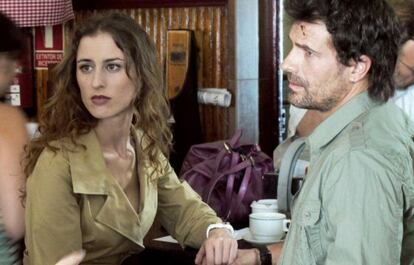The TV miniseries delving into the dark past of illegal adoptions
Antena 3 is screening a show based on the true stories of missing babies

There was a time, not that long ago, when hundreds of Spanish mothers had their babies snatched from them just after they had given birth. During the dark years of the Franco dictatorship, this happened to a lot of mothers who sided with the Republicans. But it also took place during Spain’s transition to democracy. These illegal practices went on until 1987, the year when an adoption law was passed, bringing about an end to the practice of stealing children from their biological mothers so that they could be handed over to other married couples (who were, for the most part, infertile).
This dark chapter of Spain’s history, which has only come to light over the last four or five years, is the subject of a new prime time miniseries, Historias robadas (or, Stolen stories), which began this week on Spanish TV channel Antena 3.
Courts all over Spain are dealing with more than 1,000 complaints from people who claim to be victims of networks dedicated to illegal adoptions. Very little progress has been made in the investigation so far, in many cases due to the difficulty of finding witnesses and evidence to prove the allegations. Victims’ associations have frequently complained about the government’s lack of interest regarding the issue, as well as their lack of support in supplying legal means and resources to facilitate investigations.
Among the victims were women who were single when they gave birth, couples with scant resources, and young people who had a baby as a result of adulterous relationships or out of wedlock. At some point, someone made the decision that these people would not be suitable parents, and concluded that their children should be taken from them and given to married couples with more money, but above all, with solid Catholic principles.
Courts are dealing with more than 1,000 cases of alleged illegal adoptions
Priests and nuns, backed up by like-minded gynecologists, created a network that dedicated itself to straightening out these situations.
There are a number of women who say that 25 or 30 years ago they gave birth to twins, but that someone took away one of those children to hand over to adoptive parents. After the event the doctors, the nuns or the nurses explained, with great affectation, that one of their children had died.
The mother and her partner were condemned to suffer in silence, as well as being obliged to accept the stories they were told without question, despite the fact that they had not seen the body of the baby. Priests, nuns and doctors were widely revered in the period from 1975 to 1987, an epoch when Spain was still dominated by the Catholic Church and its servants.
It is upon these events that Eva Cruz and Carlos Cruz have based their miniseries, produced by Antena 3 Films and BocaBoca Producciones. The two-part series stars Rodolfo Sancho, who plays a double role: that of Juan and his twin brother Alejandro, the children of Charo, who lost one of her children shortly after birth.
These women gave birth to twins, but someone took away one of the children
Lara Grube plays a lawyer in the show. Along with Sancho’s character, she goes in search of the secrets of his past. Juan Peña, playing another twin, provides the show with its narrative thread, given that he is determined to find the truth behind his mother’s obsessive claims that his brother did not actually die at birth, as she was told.
In general terms, the miniseries does a good job, although it falls into the trap of simplifying the characters to such a great extent that the adoptive father — a former Health Ministry official — and the gynecologist are portrayed as being pure evil. No doubt the format and televisual language necessitate such a simplification of reality, but that said, the miniseries will no doubt hold the attention of the audience.
This week, Antena 3 also screened a documentary on the nun known as Sor María, who worked as a social assistant at the maternity ward in the Santa Cristina hospital in Madrid. Sor María, who has been mentioned time and again by the victims, is one of the few people to be charged in the case, after the reuniting of a biological mother and her daughter, who was given up for adoption by the octogenarian nun in 1982.
Tu suscripción se está usando en otro dispositivo
¿Quieres añadir otro usuario a tu suscripción?
Si continúas leyendo en este dispositivo, no se podrá leer en el otro.
FlechaTu suscripción se está usando en otro dispositivo y solo puedes acceder a EL PAÍS desde un dispositivo a la vez.
Si quieres compartir tu cuenta, cambia tu suscripción a la modalidad Premium, así podrás añadir otro usuario. Cada uno accederá con su propia cuenta de email, lo que os permitirá personalizar vuestra experiencia en EL PAÍS.
¿Tienes una suscripción de empresa? Accede aquí para contratar más cuentas.
En el caso de no saber quién está usando tu cuenta, te recomendamos cambiar tu contraseña aquí.
Si decides continuar compartiendo tu cuenta, este mensaje se mostrará en tu dispositivo y en el de la otra persona que está usando tu cuenta de forma indefinida, afectando a tu experiencia de lectura. Puedes consultar aquí los términos y condiciones de la suscripción digital.








































